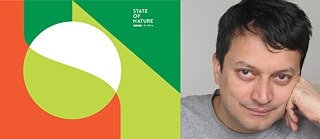Lecture
Landscapes and Languages

State of Nature in India - with Ranjit Hoskote
As ecologies in India die or mutate under the pressure of changing policy imperatives, altered land use patterns and the expansion of an urban-centric model of socio-economic advancement, the vocabularies that once described these ecologies are being erased from lived experience and cultural practice. Instead, our world-view is shaped by an official discourse, premised on a colonial understanding of forests as plantations regarded from the revenue parameters of an extractive State, itself derived from a contractarian Enlightenment paradigm that divides humankind from its environment.
Poet and cultural theorist Ranjit Hoskote will dwell on this shifting relationship between landscapes and languages, and the impact it has on ecosystems, livelihoods and forms of interrelationship that do not conform to the dominant typology.
About Ranjit Hoskote
Ranjit Hoskote has been acclaimed as a seminal contributor to Indian art criticism, and is also a leading Anglophone Indian poet. He is the author of 30 books, including Vanishing Acts: New & Selected Poems 1985-2005 (Penguin, 2006) and Central Time (Penguin/ Viking, 2014), and the monographs Zinny & Maidagan: Compartment/ Das Abteil (Museum für Moderne Kunst, Frankfurt/ Walther König, 2010) and Atul Dodiya (Prestel, 2014). He has translated the poetry of the 14th-century Kashmiri mystic Lal Ded as I, Lalla: The Poems of Lal Ded (Penguin Classics, 2011).
With Ilija Trojanow, Hoskote has co-authored Kampfabsage (Blessing Verlag, 2007; revised edition S Fischer Verlag, 2017; in English as Confluences: Forgotten Histories from East and West, Yoda, 2012). With Nancy Adajania, he is co-author of The Dialogues Series (Popular, 2011), an unfolding programme of conversations with artists. With Maria Hlavajova, he is editor of Future Publics: A Critical Reader in Contemporary Art (BAK/ Valiz, 2015).
Hoskote co-curated the 7th Gwangju Biennale with Okwui Enwezor and Hyunjin Kim (Korea, 2008). He was curator of India’s first-ever national pavilion at the Venice Biennale (2011). Hoskote’s exhibitions include two monographic surveys of Atul Dodiya (Bombay: Labyrinth/ Laboratory, Japan Foundation, Tokyo, 2001; and Experiments with Truth: Atul Dodiya, Works 1981-2013, National Gallery of Modern Art/ NGMA, New Delhi, 2013), and Unpacking the Studio: Celebrating the Jehangir Sabavala Bequest (CSMVS/ The Museum, Bombay, 2015). He was co-convenor, with Maria Hlavajova, Kathrin Rhomberg and Boris Groys, of Documents, Constellations, Prospects (Haus der Kulturen der Welt, Berlin, 2013). With Nancy Adajania, he co-curated a critical survey of 150 years of art by Parsi artists within the narrative of an emergent Indian modernism, No Parsi is an Island (NGMA, Bombay, 2013-2014, & NGMA, New Delhi, 2016).
Hoskote has been a Fellow of the International Writing Program (IWP), University of Iowa; writer-in-residence at Villa Waldberta, Munich; writer-in-residence at the Polnisches Institut Berlin; and researcher-in-residence at BAK (basis voor actuele kunst), Utrecht. He was a member of the jury for the 56th Venice Biennale (2015). He is a member of the international advisory board of the Haus der Kulturen der Welt, Berlin, and of the Bergen Assembly, Norway.